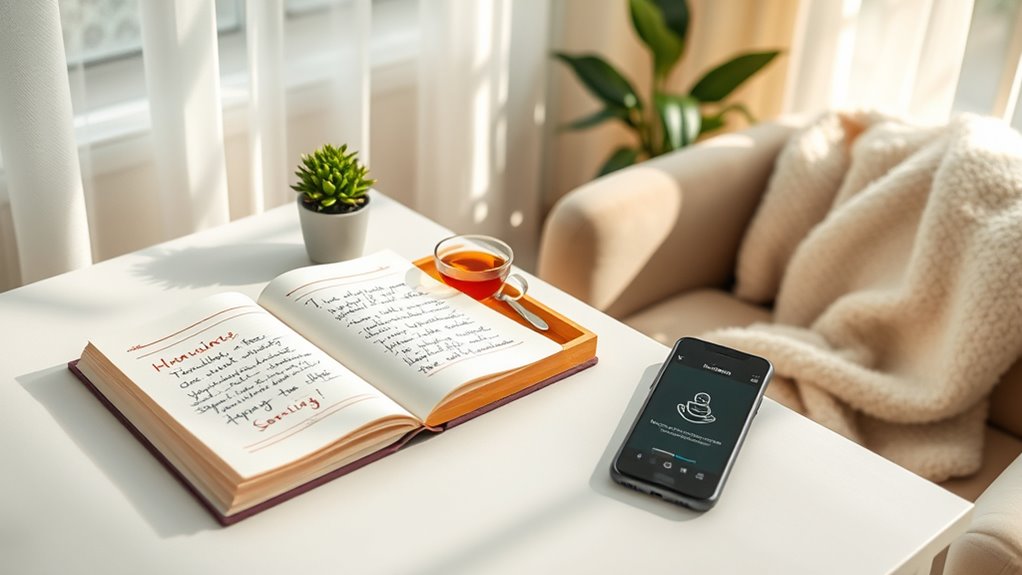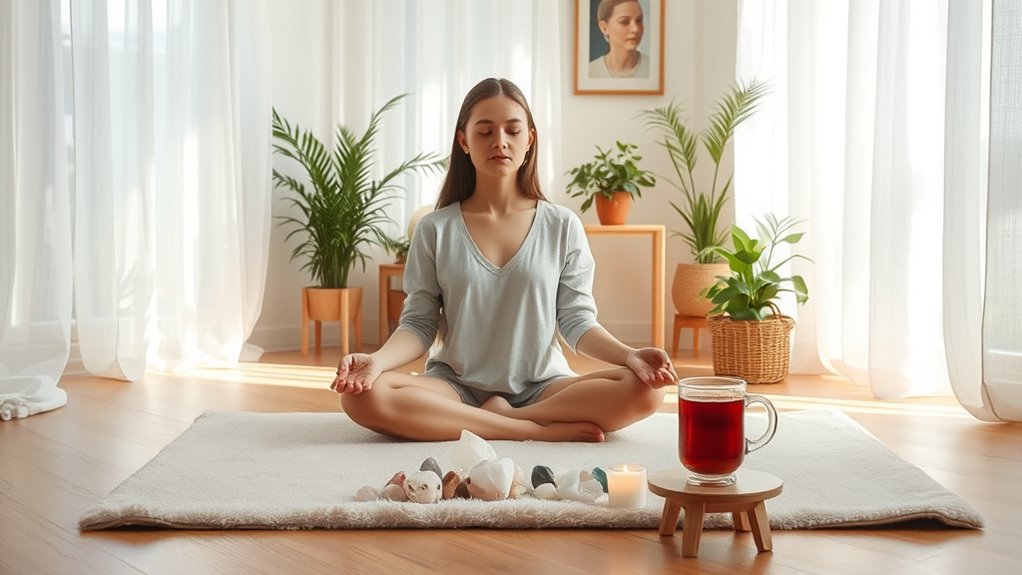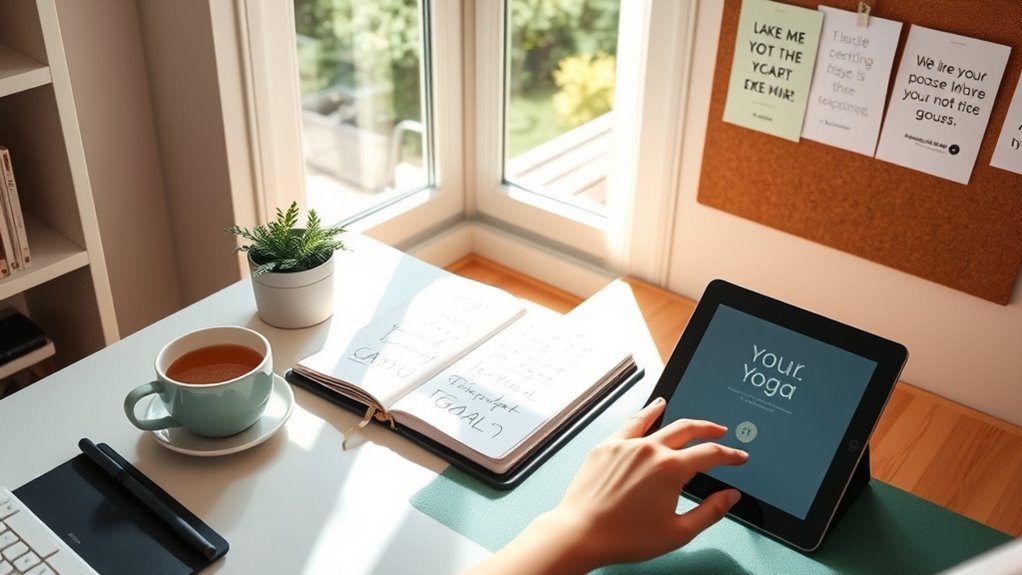Self-help strategies empower you to take control of your mental health through activities like relaxation techniques, physical exercise, healthy eating, and mindfulness. Building a personalized self-care plan, staying motivated, and maintaining supportive social connections are key steps to improve emotional resilience. Overcoming barriers and adjusting routines helps guarantee consistency. If you continue exploring, you’ll discover effective methods to enhance your well-being and develop lasting habits for mental wellness.
Key Takeaways
- Self-help strategies empower individuals to manage their mental health through practices like mindfulness, relaxation techniques, and physical activity.
- Creating personalized self-care plans involves assessing needs, setting goals, and regularly monitoring progress for ongoing well-being.
- Engaging in peer support and online communities enhances emotional resilience and reduces feelings of loneliness.
- Maintaining motivation and flexibility in routines helps sustain self-care practices despite changing circumstances.
- Addressing barriers and adopting healthy lifestyle habits, such as balanced nutrition and regular exercise, support long-term mental wellness.
Understanding the Importance of Self-Help in Mental Wellness

Understanding the importance of self-help in mental wellness is essential because it empowers you to take control of your mental health. By practicing self-care, you actively manage stress and support your emotional well-being.
Evidence shows that consistent self-help activities like mindfulness and exercise can reduce symptoms of depression and anxiety, giving you a sense of control and confidence. Engaging in these strategies boosts your self-efficacy, making you more resilient to life’s challenges. Incorporating personal growth and development techniques into your routine can further enhance your mental resilience and emotional strength.
Many mental health professionals recommend self-help as a valuable complement to therapy, helping you improve overall treatment outcomes. Furthermore, integrating AI-powered virtual reality in e-learning can offer immersive and personalized self-help tools, enhancing your engagement and progress.
Plus, using self-help resources increases your access to support, especially if you’re in a remote or underserved area with limited mental health services. Incorporating effective self-help techniques backed by research can further strengthen your mental health foundation.
Additionally, understanding Paint Sprayer Reviews & Buying Guides can help you choose the right equipment for your projects, fostering a sense of mastery and confidence in your skills. Moreover, aligning your self-help practices with principles like the Law of Attraction can enhance your mindset and attract positive outcomes.
Ultimately, self-help helps you build a stronger, more balanced mental health foundation.
Exploring Different Types of Self-Help Strategies

Have you ever wondered about the different ways you can support your mental health outside of therapy? Exploring various self-help strategies can empower you to manage stress and boost well-being. These include relaxation techniques, peer support, and self-care activities. Relaxation techniques like deep breathing and meditation help calm your mind and reduce physical tension. Peer support involves connecting with others who share similar experiences, offering encouragement and practical advice. Self-care activities, such as exercise or hobbies, strengthen resilience and improve mood. Incorporating mental clarity and health practices into your routine can further enhance your overall well-being. For example, engaging in practices like meditation can improve emotional regulation and overall mental health. Additionally, focusing on nutrient intake through healthy eating habits can support brain function and emotional stability. Developing a consistent sleep routine is also a crucial self-help strategy that can significantly impact mental health. Here’s a quick overview:
| Strategy | Example |
|---|---|
| Relaxation Techniques | Meditation, body scans |
| Peer Support | Online communities, group meetings |
| Self-Care Activities | Walking, journaling, hobbies |
| Physical Activities | Yoga, light jogging |
Creating a Personalized Self-Care Plan

To create a personalized self-care plan, start by evaluating your unique needs and daily routines to identify what areas need more attention. Incorporating self-awareness can help you better understand your emotional and physical health, enabling more targeted self-care practices. Staying informed about crypto market trends can also influence your overall well-being, as external factors may impact your mental and emotional state. Being aware of AI in Business developments can provide insights into how technological advancements might affect your work-life balance and stress levels. Set clear, achievable goals that fit into your schedule to keep your efforts focused and manageable. Additionally, exploring practices like sound healing science can offer new avenues for relaxation and stress reduction that complement your routine. Being aware of expiration signs of products like juices or vape liquids can help you maintain safe and healthy habits, preventing potential health issues.
Assess Personal Needs
How can you effectively create a personalized self-care plan? Start with a thorough assessment of your physical, emotional, mental, social, and spiritual needs. Reflect on recent stressors, habits, and routines to identify neglected areas. This helps you understand what needs attention and guides goal setting. Use the table below to clarify your priorities:
| Needs Area | Specific Goals |
|---|---|
| Physical | Improve sleep quality |
| Emotional | Practice relaxation daily |
| Mental | Engage in stimulating activities |
| Social | Increase social interactions |
| Spiritual | Dedicate time to reflection |
Regularly review and adjust your plan based on how you feel and progress, ensuring it stays relevant to your evolving needs. Additionally, understanding the importance of contrast ratio can help you select the right environment and settings for your self-care space, making your routines more effective and visually comfortable. Being aware of personality traits can further tailor your self-care strategies to better suit your individual characteristics. Incorporating knowledge about skincare products like Pimple Patches can support your skin health as part of your overall self-care routine. Recognizing the impact of ergonomic setup can improve your comfort and reduce physical strain during self-care activities. Also, exploring comfort solutions for sofa beds can enhance your rest and relaxation areas, promoting overall well-being.
Set Achievable Goals
Creating a set of achievable goals is essential for making your self-care plan effective and sustainable. Clear, specific, and measurable goals boost your motivation by giving you concrete targets to work toward.
Tailoring your goals to your individual needs, circumstances, and preferences makes them realistic and easier to stick with. Break larger objectives into smaller, manageable steps to prevent feeling overwhelmed and to help you see steady progress. Additionally, understanding production quantity variance can help you recognize areas where you can adjust your efforts for better results.
Prioritize activities that support your physical, emotional, and mental wellbeing, and set deadlines or routines to reinforce your commitment. Incorporating goal setting techniques from the latest trends can further enhance your success. Remember, impactful quotes can serve as daily reminders to stay focused and motivated as you pursue your goals.
This ongoing process keeps your self-care plan relevant, motivating, and focused on continuous progress.
Build Routine Flexibility
Building routine flexibility is essential for maintaining effective self-care, especially when unexpected demands arise.
When designing your self-care plan, include flexibility by scheduling adjustable time blocks. This allows you to adapt your routine without feeling overwhelmed.
To create a balanced routine, consider:
- Setting specific times for activities but keeping buffer periods for unforeseen events
- Reviewing and modifying your self-care plan regularly based on how activities impact your wellbeing
- Using tools like calendars, alarms, or wellness apps to track progress and stay consistent
Flexibility helps prevent burnout by allowing you to tweak your routine as needed.
This approach ensures your routine remains sustainable, supporting your mental and physical health even amid life’s unpredictability.
Incorporating Mindfulness and Relaxation Techniques

Incorporating mindfulness and relaxation techniques into your daily routine can considerably reduce stress and enhance emotional well-being.
Mindfulness practices like meditation and body scans activate the parasympathetic nervous system, helping you feel calmer and more in control.
Relaxation techniques such as deep breathing and progressive muscle relaxation can lower blood pressure, ease muscle tension, and improve your mood in just minutes.
Guided imagery and visualization exercises focus your attention on soothing scenes, decreasing cortisol levels and promoting relaxation.
Regularly using these methods strengthens your mental resilience, improves sleep quality, and reduces anxiety symptoms.
Building and Maintaining Supportive Social Connections

Maintaining social connections is essential for your well-being, even when you can’t meet in person. You can stay connected through calls, video chats, or social media to support your mental health and strengthen bonds.
Supporting loved ones remotely, like sending encouraging messages or helping out virtually, also builds trust and community.
Virtual Engagement Strategies
Virtual engagement is essential for staying connected and supporting your mental well-being, especially when physical distancing is necessary. It helps maintain social support and reduces feelings of loneliness.
To build and sustain these connections, consider these strategies:
- Schedule regular virtual communication, like video calls or messaging, with friends, family, or support groups to foster a sense of community.
- Participate in online engagement activities such as webinars, virtual events, or online classes to stay mentally active and socially involved.
- Use multimedia tools to join support groups or peer-led communities, allowing shared experiences and mutual encouragement.
Consistent virtual communication boosts feelings of connectedness and resilience, helping you stay emotionally balanced during challenging times.
Supporting Loved Ones Remotely
Building strong connections with loved ones during times when in-person meetings aren’t possible requires intentional effort. You can maintain an emotional connection by regularly checking in through phone calls, video chats, or messaging.
Offering practical support, like running errands or delivering meals, shows you care and helps them manage daily needs remotely.
Sharing coping strategies and mental health resources can boost resilience and reduce feelings of isolation.
Encourage participation in virtual social activities or support groups to promote social engagement from a distance.
Consistently expressing appreciation and empathy strengthens emotional bonds and reassures loved ones they’re cared for during challenging times.
These small but meaningful actions help build and sustain a supportive network, ensuring your loved ones feel connected, valued, and supported even when you’re apart.
Utilizing Therapeutic Resources and Peer Support

Utilizing therapeutic resources and peer support can substantially enhance your mental health journey by providing accessible tools and a sense of community. Engaging with peer support, such as support groups or online forums, helps build trust, reduce stigma, and teach practical coping strategies.
Therapeutic resources like workbooks and bibliotherapy use evidence-based reading materials to boost self-awareness and normalize your experiences. To get the most out of these tools, consider:
- Participating in peer-led activities that foster connection and shared understanding
- Using self-help books or workbooks to supplement your mental health efforts
- Combining peer support with professional therapy for improved adherence and resilience
Developing Healthy Lifestyle Habits for Mental Resilience

Developing healthy lifestyle habits is essential for building mental resilience and managing stress effectively. Prioritize self-care by establishing consistent sleep routines, eating balanced nutrition, and engaging in regular physical activity. These healthy habits strengthen your mental health and provide a stable foundation to face challenges.
Limit caffeine, alcohol, and processed foods, as they can impact your mood and increase stress over time. Incorporate mindfulness, relaxation techniques, and stress management exercises into your daily routine to boost emotional regulation.
Maintaining social connections and participating in community activities foster a sense of belonging, further supporting your well-being. By making self-care a priority, you enhance your coping skills and increase your capacity to handle life’s stressors with resilience and confidence.
Overcoming Barriers to Effective Self-Help Practices

Overcoming barriers to effective self-help practices requires recognizing the specific challenges that may stand in your way. Motivation, time, and internal or external obstacles can hinder your progress.
Recognizing and addressing your unique challenges is key to successful self-help practices.
To tackle these barriers:
- Break goals into small, manageable steps to boost motivation and avoid feeling overwhelmed.
- Schedule dedicated time for self-care, making it a non-negotiable part of your routine.
- Address internal barriers like negative self-talk by practicing self-compassion and building confidence.
External factors such as stressful environments or unsupportive relationships may also interfere. Developing tailored strategies for each challenge helps you stay on track.
Monitoring Progress and Adjusting Your Self-Help Approach

Once you’ve established self-help routines and addressed initial barriers, keeping track of your progress becomes essential. Monitoring progress through regular self-assessment helps you understand which strategies work best for your self-care.
Use journals, apps, or checklists to track your emotional states, sleep quality, and stress levels consistently. These tools provide visual evidence of your improvements and highlight patterns over time.
Review your data monthly to make timely adjustments, ensuring your self-care routines stay aligned with your changing needs. Incorporating feedback from healthcare professionals or support networks can further enhance your approach, guiding necessary modifications.
Frequently Asked Questions
What Are 5 Self-Care Strategies?
You can improve your well-being by staying physically active like walking or dancing, which lifts your mood.
Practice mindfulness through deep breathing or meditation to reduce anxiety.
Keep a regular sleep routine to stay alert and emotionally balanced.
Stay connected with supportive friends or family to fight loneliness.
Ultimately, engage in hobbies you enjoy, such as reading or creative arts, to boost positivity and manage stress effectively.
What Is a Self-Help Strategy?
You might think self-help strategies are just quick fixes, but they’re actually powerful tools you can use independently. They include activities like mindfulness, exercise, or goal setting that help you manage stress, boost resilience, and improve your well-being.
What Are the 5 C’s of Self-Care?
The 5 C’s of self-care are Compassion, Connection, Confidence, Clarity, and Creativity.
You practice compassion by being kind to yourself and accepting your feelings.
Building connection means nurturing meaningful relationships.
Confidence involves trusting yourself and maintaining a positive outlook.
Clarity encourages mindfulness and self-awareness, helping you set boundaries.
Creativity allows you to express yourself and find joy.
Together, these elements support your overall well-being and personal growth.
What Are 5 Ways to Improve Mental Health?
While mental health challenges can feel overwhelming, you can actively improve your well-being. Engage in regular physical activity to boost mood naturally.
Practice mindfulness or meditation to lower stress.
Strengthen your social connections for emotional support.
Set realistic goals and establish routines for stability.
And don’t hesitate to seek professional help when needed.
These steps empower you to take control and foster resilience in your mental health journey.
Conclusion
Remember, your self-help journey is like tending a garden—you need patience, care, and consistency to see it flourish. By exploring different strategies, creating a tailored plan, and nurturing supportive connections, you cultivate resilience and well-being. Don’t be discouraged by weeds or setbacks; instead, adapt and keep tending your mental garden. With dedication, you’ll watch your inner strength grow stronger each day, transforming challenges into opportunities for growth.








